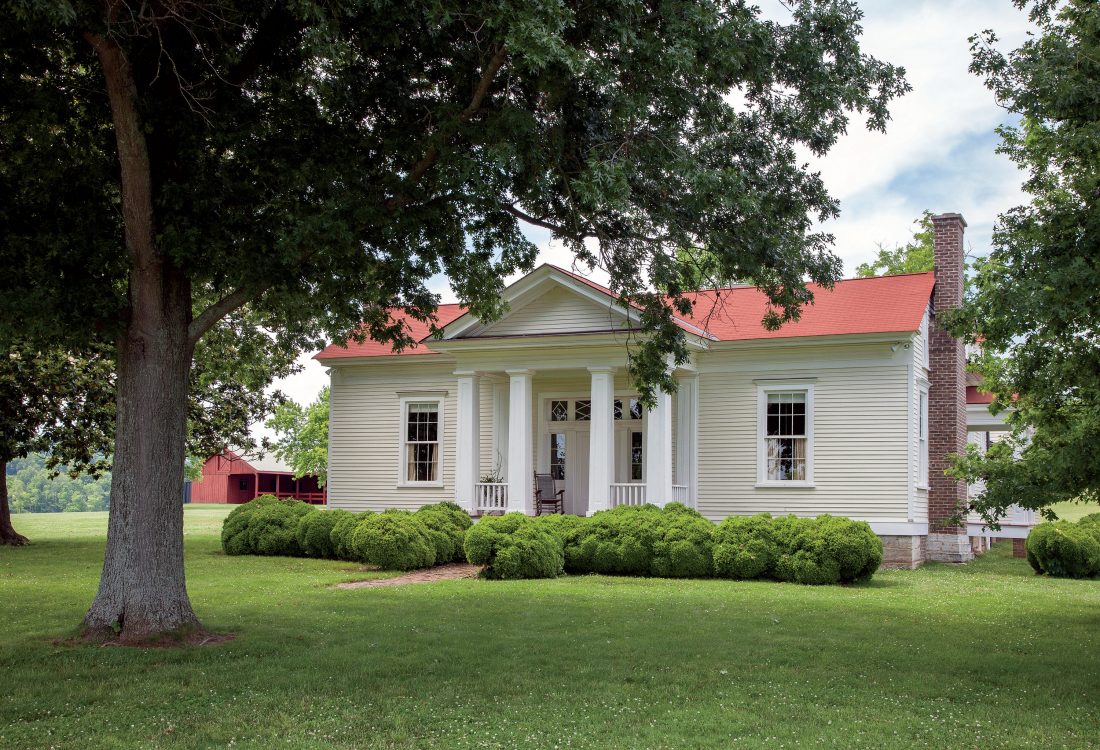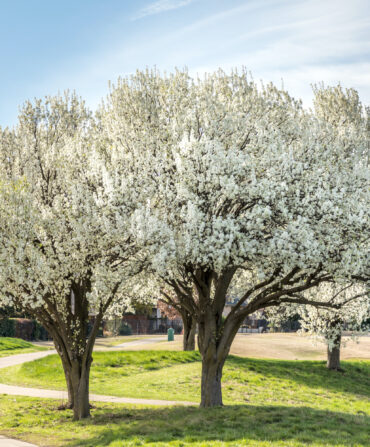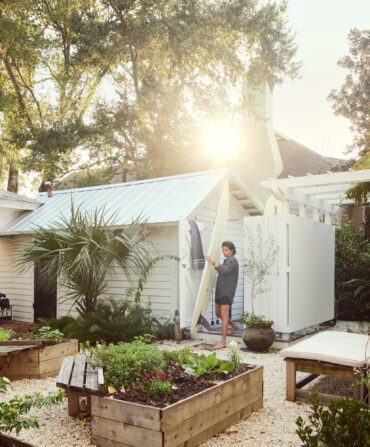Ben and Libby Page’s introduction to Giles County, Tennessee, came in the spring of 2004, when Libby’s mother decided it was time to educate the family about its roots and created a “Family History Day.” The Nashville-based clan piled onto a bus and headed south toward Pulaski, where they toured nearby farms and family homesteads, accompanied by a historian. By the end of the day, Libby, an event planner, and Ben, one of the South’s leading landscape architects, had become so smitten with the terrain—leafy rolling hills dotted with picturesque barns and nineteenth-century farmhouses—that they asked the fellow leading the tour to let them know if any property ever became available. Two weeks later, the call came. Two years later, the couple, along with their daughter, Florence, spent their first night at Brookside.
They named the house, a three-bedroom Greek Revival built around 1845, after an Italianate Revival manse a mile away, rebuilt after the Civil War by Libby’s great-grandmother. Libby describes the “new” Brookside as having been generally “buggered up” by various twentieth-century owners, the most glamorous of them a New York couple who held polo tournaments on the property during the fifties and sixties. During the Pages’ two-year renovation, the house was taken down to its studs, with the exception of the living room, the only space that retained the original plaster walls. Builders restored a back staircase, as well as a now-enclosed breezeway that joins the house to the spacious kitchen. A side porch that had been walled in was returned to its original state (albeit with a screen), and a utility area was added with an enormous soapstone sink, the first repository for vegetable and flower cuttings from the gorgeous garden. Below, the cellar was restored and converted to a game room with a custom banquette and an 1880s maple pool table the Pages found in Wiscasset, Maine.
Whenever possible, the couple enlisted Tennessee talent. James Dunn, a Nashville carpenter, did the millwork, from door and window frames to mantels and the cherry handrails on the stairs. Furniture maker Jim Horne made porch side tables (painted with lovely, chalky milk paint); a magnificent round dining table (with Tennessee cherry inlaid around the rim depicting things grown on the farm in the nineteenth century, including cotton, corn, hollyhocks, and roses); and a kitchen island/table decorated with carved symbols denoting the Pages’ combined French, English, Scottish, and Irish heritage. Nashville-based photographer Jack Spencer took the stunning open and closed magnolia images that flank the living room fireplace, near a Victorian sofa from the original Brookside. Ben’s family’s roots in Glasgow, Kentucky, get a shout-out too—the whimsical carved chickens in the kitchen came from Kentucky folk artists Lonnie and Twyla Money (he’s the carver, she’s the painter), and the graphic red-and-white quilt in a guest bedroom was made by Ben’s grandmother, who won second place for it at the Kentucky State Fair.

Photo: Caroline Allison
The living room in anchored by a pair of photographs by Jack Spencer and a Regency mirror.
The couple spends almost every weekend at the farm, less than two hours away from Nashville, and Ben spends all day Saturday on one of his two mowers or working in the gardens he designed. The cutting garden contains a dramatic “Seven Sisters” rose dug up at the original Brookside, along with peonies from Ben’s grandmother’s garden. The prolific vegetable garden includes at least ten heirloom tomato varieties and three kinds of sweet corn, in addition to carrots, beets, Kentucky Wonder beans, pattypan squash, and all manner of other goodies that end up in jars put up by Libby, a prodigious cook, or on the table at Saturday suppers with houseguests. The suppers often include more Giles County bounty: grass-fed beef from Angus cattle raised by neighbors Mike and Susan Mayfield.
First, though, comes one of the Pages’ favorite rituals, the “sunset cruise.” Gin and tonics are mixed, whiskey or wine is poured, and everyone hops onto the John Deere Gator for a trip to the high meadow at the back of the property just as the sun starts sliding down. It is moments such as these—rides up the meadow, early morning breakfasts on the porch, putting the season’s first peas and okra and beans in the ground—that Ben says constantly “refill” his spirit. “It’s the turkey walking over the hill every Saturday morning because he knows he’s home,” he says. “It’s plunging your hands in the dirt. That’s a huge deal for me. You can’t be anything but humble in a garden.”









